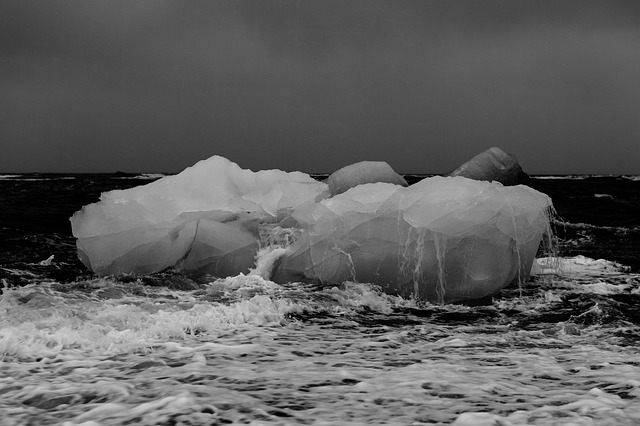This is a guest post from Agness and Cez, two best friends who’ve been traveling for 7 years and love to write about travel and the most amazing places around the world. They are passionate environmentalists and have particular concerns over the Polar Bears and the Polar Ice Caps so if you like living on earth might be worth it if you read on!
The battle for the Polar Bears and the Polar Ice Caps has long been debated in the Polar world. We at etramping.com understand how important it is to preserve both of these fundamental elements of the Arctic. That’s why Agness has written this article to help boost awareness of the growing global issues. Climate change is a hot topic (pun totally intended) and something that will go on to have an ever-greater impact on our lives.
As time has gone on, the survival of the Polar Bears and the Polar Ice Caps have become increasingly uncertain. The science is confirmed (despite what half of America seems to think). Behind the worlds leading climate scientists follow a community of climate change activists. People who want to stop the damage and preserve what we can before it’s gone. So let’s take a quick look at the current issues facing the arctic environment today….
Polar Bears and the Polar Ice Caps – Problems for the Polar Bear
Polar Bears are amazing creatures, magnificent with their large stature and fuzzy coats.
Unfortunately for the bears, they’re at serious risk. NASA states that: “polar bears are among the animals most affected by the seasonal and year-to-year decline in Arctic sea ice extent, because they rely on sea ice for essential activities such as hunting, traveling and breeding.”
These bears NEED ice to survive. Effects of global warming have hit our planet hard. There have been thousands of studies conducted on the effects of global warming, all with similar outcomes to a new study published by The Guardian that suggests climate change will continue to impact our lives more and more into the future unless changes are made right now. As the Earth continues to heat up and we hit temperatures around 2°F, the damage caused may be irreversible.
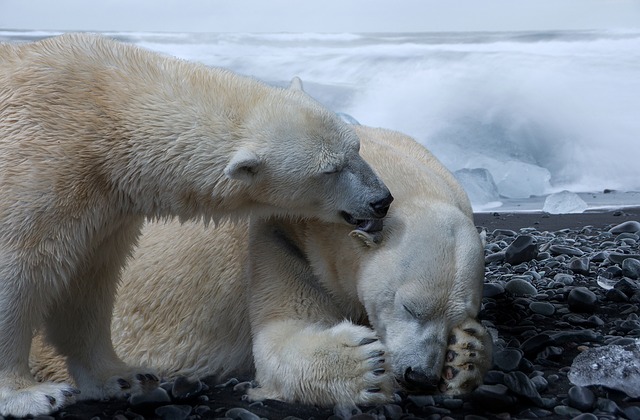
Scientists currently speculate that before mid-century many of these icy environments will have all but evaporated! Which is incredibly bad news for the bears as they depend on the sea ice for hunting prey (seals and walruses). Polar bears are very wide ranging so they are able to travel over long distances, and with these creatures on the lookout for a new home, this could mean that the bears will continue to be found further South, putting the bears in danger where they come into contact with people.
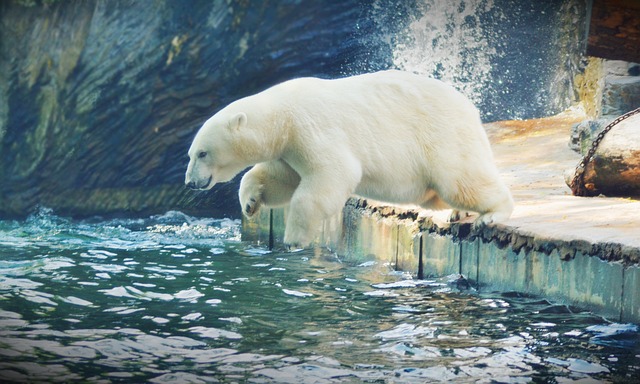
The Polar Bear’s low reproductive rate also means that as the bears die due to the ice melting or being hunted by people, they are unable to replace their numbers and so have become ever more endangered. We cannot replicate or clone them (yet), so important to help in any way we can to prevent climate change if we want to still be able to see these magnificent creatures in the wild. If we don’t act now, the battle between the caps and the bears will continue until they are both gone all together. Eventually, both sides will lose and so will we. It’s not wise to keep assuming that everything will be ok. The change starts with us. Let’s take a closer look at the polar ice caps…
Polar Bears and the Polar Ice Caps – Problems for the Polar Ice Caps
The Polar ice caps are found in the North and South Poles. Vast sheets of ice that go on for as far as the eye can see, if these happen to melt, we’re in big trouble. As the NSIDC highlights, sea levels are rising rapidly as a result of global warming.
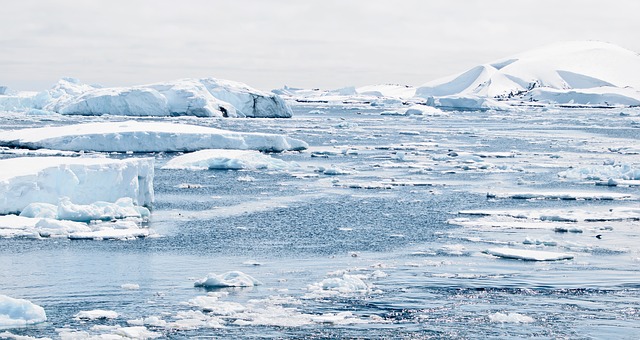
Scientists have already discovered the end date of the last ice age approximately 14,000 years ago. Now, they’re trying to predict the end of the Arctic age. At the current rate, they assume that it isn’t too far away. There may very well come a time when we no longer have stunning snow capped mountains, glaciers and floating icebergs, so do we really want to risk losing such amazing examples of the natural world? Generation after generation will miss out on what we were so lucky to see! In the technological age, it’s true that we can capture breathtaking pictures and do incredible things with virtual reality. Yet, nothing really beats the real thing. This might be the last time in history that we can full appreciate these amazing places, which makes something like taking an Antarctica cruise a once in a lifetime opportunity to travel and see and apprecaite these places before it’s too late.
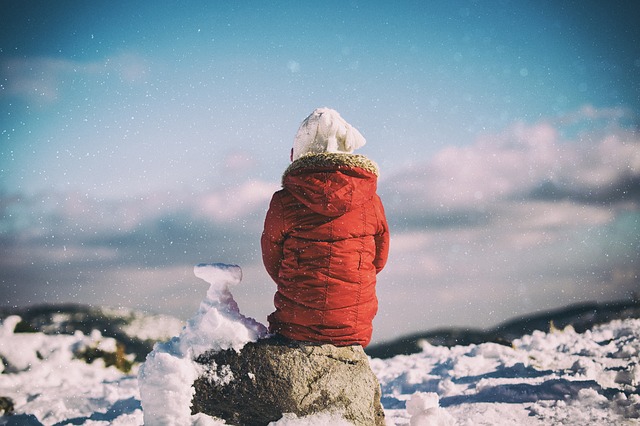
We really don’t want the sea ice to decline. Yet, this is the reality the world is facing in 2017. Scientists recently have also stated that sadly the ice is declining at a much faster rate than previously expected. Tech times state that “the sea ice will begin to vanish completely between the years 2040 and 2050. Previously, it has been estimated that the thickness of the ice in the Arctic Ocean has been dropping 17 percent every 10 years; however, the latest research suggests the drop could be slightly faster.”
Polar ice cap populations require strict monitoring and evaluation. There are many conservation charities set up to help preserve both the caps and the bears. By spreading a simple message of climate change, you can also make a difference. We only have one planet, and yet we treat it like it’s an endless resource.
How can help both the Polar Bears and the Polar Ice Caps?
So, how can we preserve both the Polar Bears and the Polar Ice Caps? Greenpeace are huge advocates of saving the Arctic. They believe that change begins with using renewable sources of energy rather than fossil fuels and a reduction in our carbon footprint.
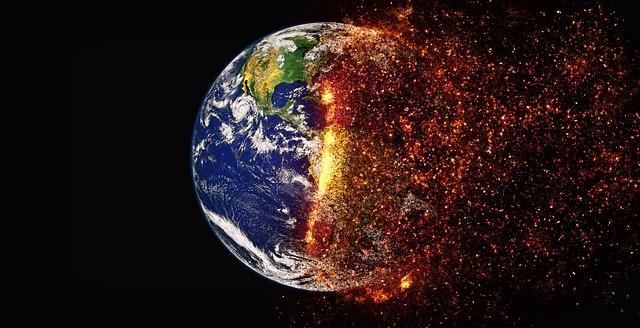
You can help to fight climate change by being energy efficient. There are so many way to do this around yur house like changing your light bulbs to LED lights or washing your clothes in cold water rather than super hot water (saves a lot of energy). We need to reduce our consumption of goods and services and be selective of what we consume. Also simple habits like turning down the heating or AC and using more energy efficient appliances. Recycling is very important too as you can save plastics and papers etc.. whilst also helping the environment!
If the struggle for the Polar Bears and the Polar Ice Caps is something that apples to you, there are plenty of societies around to join who offer environmental education. You can reduce your carbon footprint by becoming part of a green team and offering your assistance to the world! Change begins with you and me – so there’s nothing stopping you from running your own eco-friendly campaign! The possibilities are truly endless, you just need to take some action and let involved.
Every time you’re saving energy, you’re contributing to the polar bear’s survival and helping to prevent the ice caps from melting. It’s all up to us.
What are your thoughts on the Polar Bears and the Polar Ice Caps situation?

